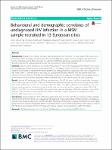Behavioural and demographic correlates of undiagnosed HIV infection in a MSM sample recruited in 13 European cities
Marcus, Ulrich
Nöstlinger, Christiana
Rosińska, Magdalena
Sherriff, Nigel
Gios, Lorenzo
Dias, Sonia F.
Gama, Ana F.
Toskin, Igor
Alexiev, Ivailo
Naseva, Emilia
Schink, Susanne Barbara
Mirandola, Massimo
Background:
Reducing the number of people with undiagnosed HIV infection is a major goal of HIV control and prevention efforts in Europe and elsewhere. We analysed data from a large multi-city European bio-behavioural survey conducted among Men who have Sex with Men (MSM) for previously undiagnosed HIV infections, and aimed to characterise undiagnosed MSM who test less frequently than recommended.
Methods:
Data on sexual behaviours and social characteristics of MSM with undiagnosed HIV infection from Sialon II, a bio-behavioural cross-sectional survey conducted in 13 European cities in 2013/2014, were compared with HIV-negative MSM. Based on reported HIV-testing patterns, we distinguished two subgroups: MSM with a negative HIV test result within 12 months prior to the study, i.e. undiagnosed incident infection, and HIV positive MSM with unknown onset of infection. Bivariate and multivariate associations of explanatory variables were analysed. Distinct multivariate multi-level random-intercept models were estimated for the entire group and both subgroups.
Results:
Among 497 participants with HIV-reactive specimens, 234 (47.1%) were classified as previously diagnosed, 106 (21.3%) as incident, and 58 (11.7%) as unknown onset based on self-reported status and testing history. MSM with incident HIV infection were twice as likely (odds ratio (OR) = 2.22, 95% confidence interval (95%CI): 1.17–4.21) to have used recreational substances during their last anal sex encounter and four times more likely (OR = 3.94, 95%CI: 2.14–7.27) not to discuss their HIV status with the last anal sex partner(s). MSM with unknown onset of HIV infection were 3.6 times more likely (OR = 3.61, 95%CI: 1.74–7.50) to report testing for a sexually transmitted infection (STI) during the last 12 months.
Conclusions:
Approximately one third of the study participants who are living with HIV were unaware of their infection. Almost two-third (65%) of those with undiagnosed HIV appeared to have acquired the infection recently, emphasizing a need for more frequent testing. Men with the identified behavioural characteristics could be considered as primary target group for HIV Pre-Exposure Prophylaxis (PrEP) to avoid HIV infection. The increased odds of those with unknown onset of HIV infection to have had an STI test in the past year strongly suggests a lost opportunity to offer HIV testing.
Files in this item

